Our furry canine friends are wonderful to have with us—that’s an understatement if you love dogs! They go with us to the park, camping, walking and hiking, etc. Sometimes, though, your pup may become somewhat smelly with what some call “DO” (Dog Odor). Or maybe your dog has been rolling in something like road kill or even worse (there’s worse—believe me—think road kill skunk on a hot summer’s day)! At these times, it’s obvious your dog needs a bath to get clean and to smell good again.
Connect with a verified veterinarian in minutes. Licensed vets are available 24/7 to answer your questions. No need to worry about your furry family member.
If your dog’s not dirty or smelly, then how do you know when it’s time to bathe him? And how often should you bathe your dog? The answer depends on some different factors.
How to Tell When Your Dog Needs a Bath
What factors help you determine when your dog needs a bath? Let’s take a look:
1. “DO” (Dog Odor): if your canine friend has developed a stinky case of “DO,” then it’s probably time for a bath.
2. Skunk Funk or Worse: if your dog’s been sprayed by a skunk, you’ll definitely need to bathe your pet as soon as possible. Skunk odor can be difficult to remove—it may take a call to your vet to find the best solution to remove the skunk’s odor from your dog’s fur.
3. Skin Conditions: certain skin conditions, such as skin allergies, make it necessary to bathe your cuddly canine more often. Your vet will usually prescribe a medicated shampoo that will work best for your pet’s condition.
4. Dog breeds: certain dog breeds have different bathing requirements; for instance, short-haired breeds with smooth coats (ex. Beagles or Weimaraners) don’t need to be bathed as often. On the other hand, breeds with oily coats (Basset Hounds) may need more frequent bathing (about once a week).
Dogs groom themselves, which helps support skin health and hair follicle growth. Even so, it’s sometimes necessary to give them a bath to help them with the process of keeping their hair and skin healthy.
Is it Bad to Bathe Your Dog Every Week?
This is a very common question and the answer depends. Just like for humans, bathing your dog too often removes the protective layer (keratinocytes) from your dog’s skin, causes irritation and even damage hair follicles. In addition, bathing your pet too often can increase the risk of bacterial or fungal infections. Not a fun scenario for your canine pal!
Most dogs do best with one bath a week. Other dogs may not need to be bathed as often. If your pet is indoors most of the time, you may only need to bathe them when you notice “DO.” When your dog is outside most of the time, a weekly bath will be necessary to take care of dirt, odor, mud and even fleas/ticks, etc.
So, is it bad to bathe your dog every week? Most dogs should do OK with a weekly bath—so go ahead! But check with your vet if your dog has a skin problem or other health issues. He may require special medicated shampoos and other products to help his skin.

Review symptoms, medications & behavior to keep your pets healthy with a Vet Online in just minutes.
Ask a Vet Live NowHow Often to Bathe a Dog with Allergies?
The first thing to understand is that bathing is one of the most under utilized therapies for dogs who have skin problems. The main reason for this goes back a few decades when medicated dog shampoos contained harsh ingredients that dried and irritated the skin. People were told not to bathe their skin allergy dog more than once a week. However, these days, you may need to bathe your dog more often and you’ll find a wide selection of shampoos for dogs with allergies that soothe and condition, rather than irritate the skin.
How often to bathe a dog with skin allergies? It will depend on your dog, their coat and undercoat, and the condition of their skin. Some dogs may need to be bathed as often as every three to four days, while others may only require a bath once a week. Ask your vet to see they recommend as to bath frequency and the type of shampoo needed especially for your dog’s skin condition.
How Often to Bathe a Dog with Fleas
The joys of romping with your canine friend outdoors! However, those outdoor romps may take you through flea-infested areas, where your dog could pick up some very tiny hitch hikers. You’ll notice when your dog’s got some tiny hitch hikers—he will begin to scratch and bite almost constantly. If you notice this, be sure to check your dog really well to see if there really are fleas or if your dog has another skin problem. You’ll find fleas behind your dog’s ears, under the chin and above the tail. You may even see these tiny bugs walking on your pet’s back or belly.
Makes you itch just thinking about it!
Now, it’s time to consider a flea shampoo for your dog. Look for flea shampoos that kill both adult fleas and their eggs. These tend to be a little more expensive, but these shampoos work to cut the flea’s lifecycle—from eggs to adults. Many of these shampoos contain pyrethrins, which are insecticides. These tend to be very strong and may be too much for small dogs and puppies. Check with your vet to see if they know of some natural flea shampoos that would work for your sensitive pup.
How often to bathe a dog with fleas? You’ll need to follow the flea shampoo’s directions as to how often or go with your veterinarian’s recommendations. Another tip—after shampooing and your dog is flea-free for a few days, check to see if there are fleas again. If so, it might be time for another flea bath.
At What Age Can You Bathe a Puppy?
Wriggly, squiggly puppies—who doesn’t love them! They’re warm and sweet, so innocent and small you want to cuddle them and never put them down! Puppies are all that, but sometimes they do get dirty. So, at what age can you bathe a puppy?
Puppies should be 12 weeks or older before you give them their first bath. Smaller than this, and dog shampoos may be too harsh for the puppy’s delicate skin. If your younger puppy gets dirty, you can clean them off with a warm washcloth, then dry your puppy thoroughly with a towel.
It’s helpful to start bathing your puppy by 12 weeks—this way, he will get used to being bathed and will find it a soothing, relaxing time with you. If you wait until a dog is already several months old before their first bath, you may find they are extremely scared and want nothing to do with the water or the bathtub! So, start your puppy with a weekly bath at around 12 weeks of age. You’ll both be happier for it!
I Never Bathe my Dog
You may hear some people say, “I never bathe my dog.” Wow—it may come as quite a shock, but there are humans who don’t bathe their furry dog pals! How do they keep their dogs clean and smelling good?
One thing you can do, if your dog doesn’t need a bath, is to brush your pet’s hair or fur every day. A good daily brushing helps distribute the natural oils of your pup’s hair/fur. Your dog will shine from head to toe with a healthy glow (rhyme was accidental!).
Daily brushing also cuts down on the amount of shedding
Another way to keep your pet clean without bathing is to use wipes made especially for dogs (or even the ones for horses, if you have a large dog). Dog grooming wipes can clean and deodorize as you clean your dog. Don’t use baby wipes on your dog. Baby wipes are fine, but they’re not meant for pets and may contain harmful ingredients. If you’re going to use wipes, then buy dog grooming (or horse grooming) wipes—these are safe for your pup! If you have any questions about which wipes to use, be sure to check with your veterinarian.
How to Bathe Your Dog
Now we’ll take a look at how to bathe your dog and what to wash or not!
1. Brush: before giving your dog a bath, be sure to brush out all the loose fur and dirt.
2. Lukewarm water: use lukewarm water for your dog’s bath. Hot water can burn your dog, and even warm water can irritate any skin conditions your pup may have.
3. Stay calm: your dog or puppy may be nervous in the tub, so be sure to stay calm and speak to your pet with a reassuring voice. Don’t forget to be patient—it takes some dogs a few times in the tub to realize you’re not trying to hurt them.
4. Dog shampoo: only use shampoo especially made for dogs! Human shampoos can be too harsh on your dog’s skin. Doggie shampoo is less drying and irritating.
5. Rinse: be sure to completely rinse all of the shampoo from your dog once you’re done giving the bath. Shampoo residue that remains on your dog’s skin can cause irritation and dryness. Rinse until the cows come home and all the shampoo’s gone!
6. Dry: towel-dry your pup and then you can either air-dry your pup after the bath, or use a human blow-dryer set on low. Don’t ever use a human hair-dryer set on high, as this can cause burns on your dog’s skin.
Tip: Bathe dogs from the ears back. You can use a wipe on their face and ears, or even a warm, wet washcloth will work.
As you can see, there’s no hard and fast rule about when or even if to bathe your dog. It depends on many factors including: breed, skin conditions (allergies, infections, etc.), and smelliness (“DO” and skunk funk) and level of dirtiness. Most dogs can be bathed once a week, while others may only need to be bathed every three or four months. You’ll know it when your dog comes in one day…is there a wafting odor as he goes by? Is there mud all over your floor? Probably time to bathe your dog!
Connect with a verified veterinarian in minutes. Licensed vets are available 24/7 to answer your questions. No need to worry about your furry family member.

Julie
Julie is a graduate of the University of North Carolina, Wilmington, where she studied Animal science. Though contrary to the opinion of her parents she was meant to study pharmacy, but she was in love with animals especially cats. Julie currently works in an animal research institute (NGO) in California and loves spending quality time with her little cat. She has the passion for making research about animals, how they survive, their way of life among others and publishes it. Julie is also happily married with two kids.
Review symptoms, medications & behavior to keep your pets healthy with a Vet Online in just minutes.
Ask a Vet Live Now



